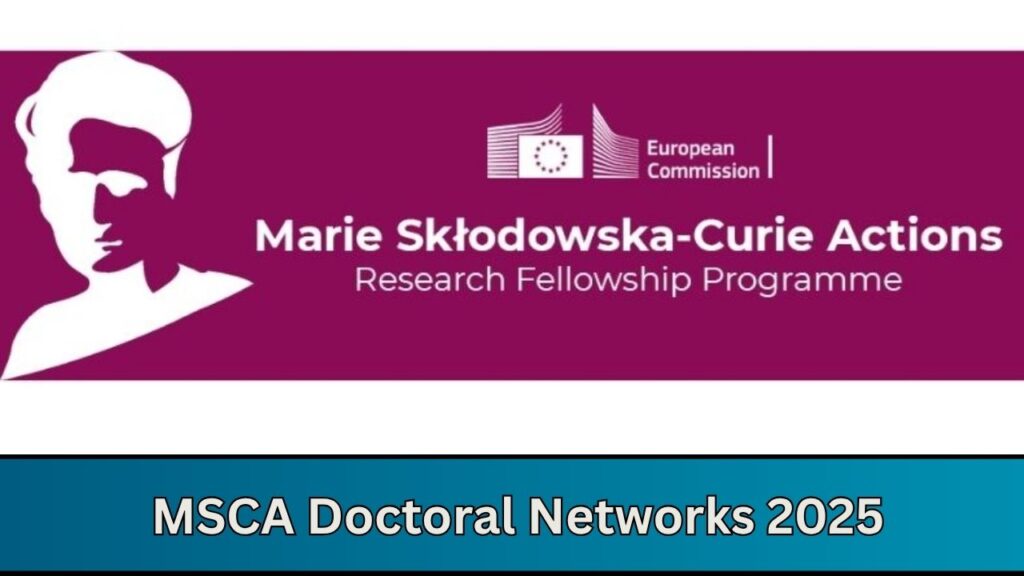The MSCA Doctoral Networks 2025 call is now open, presenting an unparalleled opportunity for aspiring doctoral candidates and research institutions across Europe and beyond. If you’re aiming to be part of a cutting-edge, international, and collaborative doctoral programme, or if your institution is looking to host and train the next generation of leading researchers, this guide is your essential companion. We’ll break down what this prestigious initiative offers, how to navigate the process, and how you can become involved in shaping the future of research.

MSCA Doctoral Networks 2025
| Key Fact | Detail/Statistic |
|---|---|
| Call Status & Deadline | Open from May 28, 2025. Deadline for proposal submission by institutions: November 25, 2025 (17:00 CET). |
| Total Funding Available | €597.8 million |
| Expected Impact | Funding for over 150 projects, training over 2000 doctoral candidates. |
| Who Submits Proposals? | Consortia of organisations (universities, research institutions, businesses, SMEs, etc.). |
| Where PhD Candidates Apply | Individual PhD candidates apply to funded projects, typically advertised on the EURAXESS portal, from early 2026 onwards. |
| Mobility Rule for PhD Candidates | Must not have resided or carried out main activity in the host country for more than 12 months in the 3 years prior to recruitment. |
What Exactly Are MSCA Doctoral Networks?
The Marie Skłodowska-Curie Actions (MSCA) Doctoral Networks, part of the European Union’s Horizon Europe programme, are designed to train highly skilled doctoral candidates. These networks foster creativity, innovation, and entrepreneurship, ultimately boosting researchers’ long-term employability in both academic and non-academic sectors.
Think of them as international research schools built by partnerships of universities, research institutions, businesses, and other organizations from different countries. The core idea? To provide a unique training experience that goes beyond a standard PhD. This means exposure to different sectors, disciplines, and cultures. In my experience advising institutions, the inter-sectoral component is a particularly strong driver for innovation and future career success for the candidates.
Why Should You Aim for an MSCA Doctoral Network?
The benefits are substantial, whether you’re an aspiring PhD candidate or an institution.
For Doctoral Candidates:
- World-Class Training: Access to excellent research environments and innovative doctoral training programmes.
- International Experience: Live and work in different countries, broadening your horizons.
- Inter-Sectoral Exposure: Gain experience in both academic and non-academic settings (like industry or NGOs), which is invaluable for career flexibility.
- Enhanced Career Prospects: Develop a robust set of research-related and transferable skills highly sought after by employers.
- Attractive Funding: Receive a generous package covering living and mobility allowances, and potentially family, long-term leave, and special needs allowances. According to the MSCA website, this funding ensures researchers have good employment conditions.
- Networking: Build a strong international network of peers and senior researchers.
Are You Eligible? Understanding the Criteria
It’s crucial to distinguish between eligibility for institutions forming a network and individual doctoral candidates.
For Institutions (Consortia Applying for Funding)
- A consortium must typically consist of at least three independent legal entities.
- Each of these entities must be established in a different EU Member State or a Horizon Europe Associated Country.
- At least one of the three entities must be established in an EU Member State.
- Organisations from any country in the world can join in addition to this minimum, fostering global collaboration.
- Specific conditions apply for Industrial Doctorates and Joint Doctorates regarding the composition of the consortium and the awarding of degrees, as detailed in the MSCA Work Programme and Guide for Applicants.
For Doctoral Candidates (Applying to Funded Projects)
- No Doctoral Degree: You must not have a doctoral degree at the date of your recruitment.
- Any Nationality: Researchers of any nationality can apply.
- Enrolment: You must be enrolled in a doctoral programme during the project.
- Mobility Rule: This is a key criterion. You must not have resided or carried out your main activity (work, studies, etc.) in the country of the recruiting organisation for more than 12 months in the 36 months immediately before your recruitment date.
- Industrial Doctorates: If applying for an ID position, you will spend at least 50% of your time in the non-academic sector.
Navigating the 2025 Call: Key Dates & What Institutions Need to Know
For universities, research centres, and businesses planning to form a network and apply for funding, the clock is ticking:
- Call Opened: May 28, 2025
- Proposal Submission Deadline: November 25, 2025 (17:00 Brussels time)
- Information for Applicants: The European Commission and National Contact Points (NCPs) provide extensive documentation. An MSCA Doctoral Networks 2025 Call Information Day is scheduled for June 24, 2025 – a must-attend for potential applicants.
- Submission Portal: Applications are submitted electronically via the EU Funding & Tenders Portal.
Crafting a Winning Proposal: Essential Tips for Institutions
A successful MSCA Doctoral Network proposal is a significant undertaking. Based on evaluator feedback and successful project examples, here’s what to focus on, structured around the main evaluation criteria.
1. Excellence (Weight: 50%)
- Scientific Quality: Clearly articulate the novelty and ambition of the research programme. Is it cutting-edge? Does it address significant challenges?
- Training Programme: Detail a high-quality, innovative training plan. This must include research-specific skills and transferable skills (e.g., communication, project management, entrepreneurship). The MSCA guidelines emphasize this dual focus.
- Supervision: Demonstrate robust supervision arrangements, including joint supervision where appropriate, especially for IDs and JDs.
2. Impact (Weight: 30%)
- Career Perspectives: Explain how the network will enhance the career prospects of the doctoral candidates.
- Contribution to Society & Economy: Outline the expected scientific, societal, and economic impacts of the research and training.
- Sustainability: How will the collaborations and training structures potentially continue beyond the project funding?
3. Quality and Efficiency of the Implementation (Weight: 20%)
- Work Plan: Present a clear, realistic, and well-structured work plan with defined work packages, deliverables, and milestones.
- Management Structure: Describe an effective management structure, including risk management.
- Consortium Quality: Demonstrate the complementarity of the partners and their collective expertise to implement the project. Each partner should have a clear role.
- Infrastructure & Resources: Ensure the participating organisations have the necessary infrastructure and resources.

For Aspiring PhD Candidates: How to Find and Apply to a Doctoral Network Position?
If you’re a prospective PhD student, your journey is slightly different. You don’t apply to this initial call. Instead.
- Wait for Funded Projects: After the November 2025 deadline, proposals from institutions will be evaluated. Successful networks are expected to be announced around April 2026, with projects starting from mid-2026 onwards.
- Search on EURAXESS: Once projects are funded, they will advertise their individual PhD positions. The primary place to find these is the EURAXESS Jobs & Funding portal. Set up alerts for keywords relevant to your research interests.
- Check University/Network Websites: Keep an eye on the websites of universities and research institutions known for their involvement in MSCA projects.
- Prepare Your CV and Motivation Letter: Tailor your application to each specific PhD position, highlighting how your skills and research interests align with the project.
FAQs
Q1: What are the main differences between Standard, Industrial, and Joint Doctoral Networks?
Standard Doctoral Networks (DN) are the most common type, focusing on training within a consortium. Industrial Doctorates (ID) mandate significant involvement from the non-academic sector, with candidates spending at least 50% of their time there and having joint supervision. Joint Doctorates (JD) involve a highly integrated programme leading to a joint, double, or multiple doctoral degree awarded by at least two institutions.
Q2: Can an organisation from a country not in the EU or Horizon Europe Associated Countries participate?
Yes, organisations from third countries can participate as associated partners. They can be vital for specific expertise or training opportunities. While they are not always automatically eligible for direct funding from the EU (though exceptions exist for low and middle-income countries), their participation is encouraged to enhance international cooperation.
Q3: As a PhD candidate, can I propose my own research project when applying to a Doctoral Network?
Generally, Doctoral Networks advertise specific PhD positions that are part of a larger, pre-defined research programme developed by the consortium. While your specific research within that position will be shaped with your supervisors, you typically apply to an existing project rather than proposing an entirely independent one at the application stage to the network.










